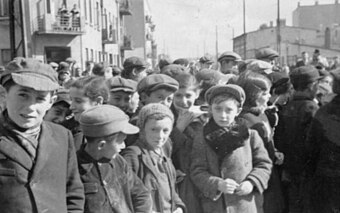Ghetto Litzmannstadt
| Łódź Ghetto Ghetto Litzmannstadt |
|
|---|---|

Jewish children inside Ghetto Litzmannstadt, 1940
|
|

Map of the Łódź Ghetto within the city. Walled-off area in blue, the Jewish cemetery in green, Radegast train loading station at the top right of this map; in red: Kinder KZ for Polish children
|
|
| Location | Łódź, German-occupied Poland |
| Persecution | Imprisonment, forced labor, starvation |
| Organizations | Schutzstaffel (SS) |
| Death camp | Chełmno extermination camp, Auschwitz-Birkenau extermination camp |
| Victims | 204,000 Polish Jews |
The Łódź Ghetto (German: Ghetto Litzmannstadt) was a World War II ghetto established by the Nazi German authorities for Polish Jews and Roma following the 1939 invasion of Poland. It was the second-largest ghetto in all of German-occupied Europe after the Warsaw Ghetto. Situated in the city of Łódź, and originally intended as a preliminary step upon a more extensive plan of creating the Judenfrei province of Warthegau, the ghetto was transformed into a major industrial centre, manufacturing much needed war supplies for Nazi Germany and especially for the German Army. The number of people incarcerated in it was augmented further by the Jews deported from the Reich territories.
Because of its remarkable productivity, the ghetto managed to survive until August 1944. In the first two years, it absorbed almost 20,000 Jews from liquidated ghettos in nearby Polish towns and villages, as well as 20,000 more from the rest of German-occupied Europe. After the wave of deportations to Chełmno death camp beginning in early 1942, and in spite of a stark reversal of fortune, the Germans persisted in eradicating the ghetto: they transported the remaining population to Auschwitz and Chełmno extermination camps, where most were murdered upon arrival. It was the last ghetto in occupied Poland to be liquidated. A total of 204,000 Jews passed through it; but only 877 remained hidden when the Soviets arrived. About 10,000 Jewish residents of Łódź, who used to live there before the invasion of Poland, survived the Holocaust elsewhere.
...
Wikipedia
